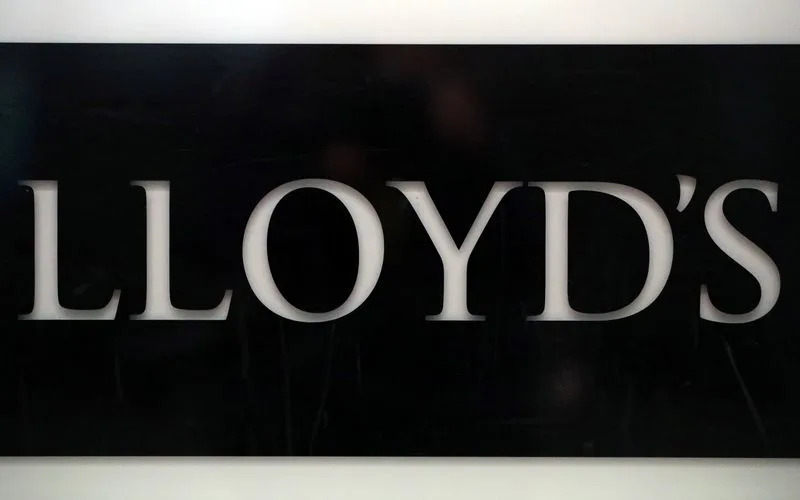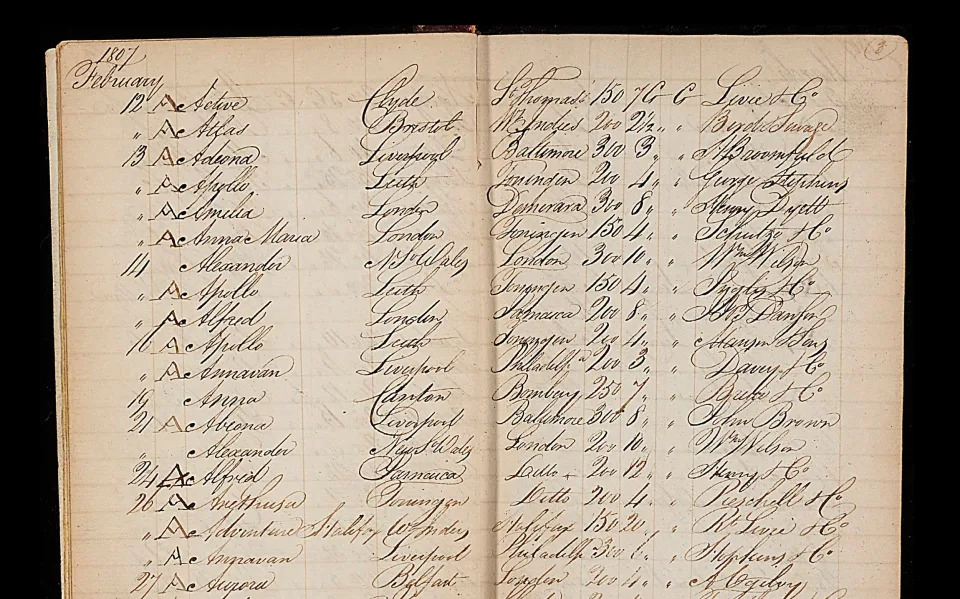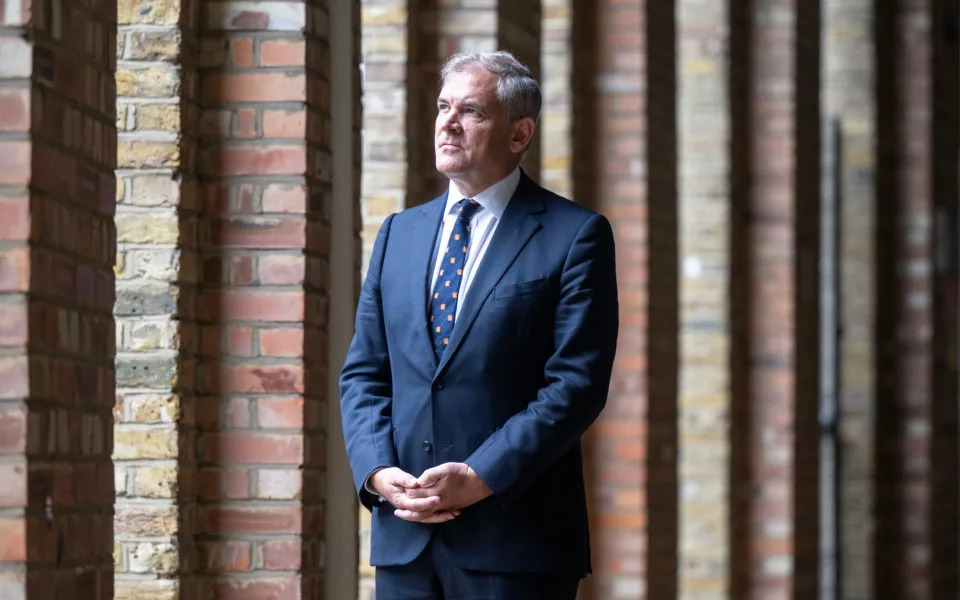Lloyd's of London to invest $65 million following slavery report
Wed, November 8, 2023

Lloyd's of London logo at City of London financial district
By Carolyn Cohn
LONDON (Reuters) -Lloyd's of London will invest 40 million pounds ($49.6 million) in regions affected by the transatlantic slave trade, it said on Wednesday, after a report showed the commercial insurance market had strong links to the trade.
Lloyd's will also spend around 12 million pounds on a programme to improve recruitment and progression for Black and other ethnic minority employees in the commercial insurance market, including bursaries for Black university students, it said in a statement.
Lloyd's formed part of a sophisticated network of financial interests that made the slave trade possible, according to research published by Black Beyond Data, based at Johns Hopkins University.
The research was funded by the Mellon Foundation, and Lloyd's said it had no editorial control over the findings.
The 335-year old insurance market apologised in 2020 for its role in the 18th and 19th century slave trade.
"We've asked ourselves how we could have the greatest impact," Lloyd's Chairman Bruce Carnegie-Brown told Reuters. "We can't change the wrongs of the past, but we can make a difference today."
Lloyd's said its Central Fund will invest $25 million in a bond administered by the African Development Bank and $25 million in a bond administered by the Inter-American Development Bank. The bonds will support the UN Sustainable Development Goal of "reduced inequality".
The Lloyd's market is made up of nearly 50,000 people, and Lloyd's wants one in three new hires to come from ethnic minorities. The figure was 17% in 2022.
Historians estimate between one and two-thirds of the British marine insurance market was based on the slave trade in the 18th century.
Alexandre White, assistant professor at Johns Hopkins University, said the Black Beyond Data team had examined material from the Lloyd's archive, including ledgers where insurers recorded policies for ships leaving Liverpool as part of the trade.
"Lloyd's played a central role in the underwriting of marine insurance pertaining to the slave trade," he said.
The Black Beyond Data research showed at least one third of all slaving voyages leaving Britain in 1807, for example, came through Lloyd’s for the underwriting of particular legs or the whole voyage.
The research also showed that Joseph Marryat, Lloyd's of London chairman from 1811 to 1824, had enslaved people, White added.
"There's no way to compensate for the damage that has been done - too much has happened," said Junior Garba, co-founder of Equity, which provides recruitment and mentoring services for minority groups in the insurance sector. Garba added that Lloyd's initiatives were "a good starting point".
The Church of England earlier this year committed 100 million pounds to address the "shameful" wrongs of its links to slavery.
The United Nations has said countries should consider financial reparations among measures to compensate for the enslavement of people of African descent.
African and Caribbean entities have called for reparations, and the European Union has hinted at them. Some U.S. senators also support reparations.
($1 = 0.8135 pounds)
(Reporting by Carolyn Cohn; editing by Sinead Cruise, Jan Harvey, Elaine Hardcastle)
Wed, November 8, 2023

Lloyd's of London logo at City of London financial district
By Carolyn Cohn
LONDON (Reuters) -Lloyd's of London will invest 40 million pounds ($49.6 million) in regions affected by the transatlantic slave trade, it said on Wednesday, after a report showed the commercial insurance market had strong links to the trade.
Lloyd's will also spend around 12 million pounds on a programme to improve recruitment and progression for Black and other ethnic minority employees in the commercial insurance market, including bursaries for Black university students, it said in a statement.
Lloyd's formed part of a sophisticated network of financial interests that made the slave trade possible, according to research published by Black Beyond Data, based at Johns Hopkins University.
The research was funded by the Mellon Foundation, and Lloyd's said it had no editorial control over the findings.
The 335-year old insurance market apologised in 2020 for its role in the 18th and 19th century slave trade.
"We've asked ourselves how we could have the greatest impact," Lloyd's Chairman Bruce Carnegie-Brown told Reuters. "We can't change the wrongs of the past, but we can make a difference today."
Lloyd's said its Central Fund will invest $25 million in a bond administered by the African Development Bank and $25 million in a bond administered by the Inter-American Development Bank. The bonds will support the UN Sustainable Development Goal of "reduced inequality".
The Lloyd's market is made up of nearly 50,000 people, and Lloyd's wants one in three new hires to come from ethnic minorities. The figure was 17% in 2022.
Historians estimate between one and two-thirds of the British marine insurance market was based on the slave trade in the 18th century.
Alexandre White, assistant professor at Johns Hopkins University, said the Black Beyond Data team had examined material from the Lloyd's archive, including ledgers where insurers recorded policies for ships leaving Liverpool as part of the trade.
"Lloyd's played a central role in the underwriting of marine insurance pertaining to the slave trade," he said.
The Black Beyond Data research showed at least one third of all slaving voyages leaving Britain in 1807, for example, came through Lloyd’s for the underwriting of particular legs or the whole voyage.
The research also showed that Joseph Marryat, Lloyd's of London chairman from 1811 to 1824, had enslaved people, White added.
"There's no way to compensate for the damage that has been done - too much has happened," said Junior Garba, co-founder of Equity, which provides recruitment and mentoring services for minority groups in the insurance sector. Garba added that Lloyd's initiatives were "a good starting point".
The Church of England earlier this year committed 100 million pounds to address the "shameful" wrongs of its links to slavery.
The United Nations has said countries should consider financial reparations among measures to compensate for the enslavement of people of African descent.
African and Caribbean entities have called for reparations, and the European Union has hinted at them. Some U.S. senators also support reparations.
($1 = 0.8135 pounds)
(Reporting by Carolyn Cohn; editing by Sinead Cruise, Jan Harvey, Elaine Hardcastle)
Adam Mawardi
Wed, 8 November 2023

Lloyd's Building in the City of London
More than 300 years ago, auction-goers gathered around a candle in Edward Lloyd’s Coffee House, a popular meeting place for sailors, merchants and ship owners near the banks of the River Thames.
Up for sale was a 220 tonne ship with 12 guns, named James and Frances. Bidding began once the candle was lit and stopped after it had burnt an inch.
In 1701, the James and Frances embarked on its voyage, from London to Africa and then on to Jamaica. It was carrying 162 enslaved Africans – 32 of whom died during the journey.
The candle auction is just one of many examples of the deep involvement that the institution now known as Lloyd’s of London had in the transatlantic slave trade between the 17th and 19th centuries.
The insurance marketplace, one of the City’s most historic institutions, was involved in auctioning or insuring ships that ferried hundreds of thousands of enslaved people.
The true scale of this historic stain on its reputation has been unearthed by researchers at John Hopkins University, the first to be given access to the 300-year-old institution’s huge archive of letters, newspaper adverts, certificates and other documents.
Lloyd’s had already apologised for its historical links to the slave trade in 2020, when outrage over the death of George Floyd prompted a public reckoning about the treatment of black people past and present by major institutions.
However, the John Hopkins research lays bare just how intimately involved the institution was in the slave trade.
Slavery was “critical to the members” of Lloyd’s as a major source of insurance business, researchers found. Senior figures from the past were also enslavers and absentee owners of slave plantations themselves.

Historical documents provided by Lloyd's to researchers at John Hopkins University have revealed the extent to which the institution was involved in the slave trade
“Insurance was an important innovation, mostly in the late 17th and 18th centuries, and it allowed slave traders to manage risk in a very efficient way,” says Sean Kelley, a transatlantic slave trade expert and professor at the University of Essex.
“If that insurance had not been available – and it wasn’t, after it became illegal in 1807 – slave traders would have had to devise other ways of managing risk that were less efficient.”
Bruce Carnegie-Brown, Lloyds of London’s chairman, apologised again on Wednesday as John Hopkins published its findings.
In an effort to atone for its links to slavery Lloyd’s – a marketplace that handles more than £46bn worth of premiums per year – has promised to spend £52m on racial equality initiatives, including plans to support black and other ethnic minority people in work and education.
“I don’t think we can undo the wrongs of the past, but we can take action to address the impacts which are still seen today,” Carnegie-Brown said in a statement.
But rather than resolving the matter, the seven-figure sums threaten to reignite the issue of the City’s links to slavery, raising questions about which institutions will be next and whether they are prepared to pay for the past.
Lloyd’s is not alone: many other British institutions played a part in the slave trade, although the links are not always straightforward.

Bruce Carnegie-Brown, Lloyds of London’s chairman, said institutions with link to slavery can ‘take action to address the impacts which are still seen today’ - Paul Grover
Although Barclays takes its name from David Barclay – a Quaker who campaigned for the abolition of slavery in the late 18th century – the bank became linked with the Colonial Bank in 1918 and Martins Bank in 1969, institutions that both had links to slavery.
Directors of banks that went on to become part of Royal Bank of Scotland – today known as NatWest Group – also owned slaves and provided loans to plantation owners, according to a database maintained by University College London.
Manuel Barcia, professor of global history at the University of Leeds, puts it simply: “Almost any institution that goes back hundreds of years is likely to have some kind of involvement.”
“You have decisions that were being taken in European capitals that lead to the death and enslavement of hundreds of thousands, if not millions, of people.”
Preparing a single slave ship for voyage would often have involved a range of different parties, including banks who had extended credit to the merchants, lawyers who drew up the contracts and, of course, the captain and crew.
“You get a sense of this by just looking at the accounts that some of these slave traders kept,” Kelley explains. “There’s a major spread effect that flows out from all this.”
Many British companies were quick to offer their apologies for historical links to slave trade at the height of the Black Lives Matter movement.
Greene King, one of the UK’s largest pub chains, promised to make a “substantial investment” in ethnic minority groups in 2020 in recognition of the fact that its founders profited from slavery and argued against its abolition in the 1800s. It has since renamed pubs with racist connotations, including the Black Boy.
Meanwhile, London-based magic circle law firm Freshfields Bruckhaus Deringer said it was taking a deeper look into its past, having repeatedly expressed “regret” that one of its founding members acted as a trustee for several slave-owners in the West Indies.
A spokesman said: “We are working to understand our history so that we can acknowledge and learn from it, in addition to the independent historical research we are funding on the role of the City of London and its ecosystem in relation to the transatlantic slave trade.”
Both Barcia and Kelley say one of the most important things businesses can do to help is be fully transparent.
Barcia argues companies should also speak to the descendants of slavery to understand how it has impacted them – and then try to make a tangible difference, perhaps through scholarships and other initiatives aimed at boosting opportunity.
In this vein, Lloyd’s says it will fund diversity initiatives and charities supporting disadvantaged black people and ethnic minorities. It promises to help provide them with more opportunities for employment and places to study at university.
Mark Lomas, head of culture at Lloyd’s, says: “We’re aware that no one can properly atone for the past.
“But what we have done is set out a framework that we believe will make sustainable change over a long term period.”
Lloyd’s will be hoping its initiatives can help it move on from its shameful past. But the proposals have been met with criticism in some quarters.
“This is PR: giving an apology, making some commitments, but this is not serious,” says Kehinde Andrews, a professor of black studies at Birmingham City University.
“You’re talking about massive amounts of wealth that they owe back to people.”

Laura Trevelyan donated £100,000 to the island of Grenada in recognition of her family’s historic links to the slave trade there - David Levenson
Calls for direct reparations to the descendants of slaves have been growing, given impetus by BBC journalist Laura Trevelyan’s decision to donate £100,000 to the island of Grenada in recognition of her family’s historic links to the slave trade there.
Lloyd’s has so far resisted calls from Caribbean nations to pay direct reparations to the descendants of slaves, arguing that a lack of documentation makes it “impossible” to identify all those affected.
But the disagreement underscores how difficult these issues are and how hard it is to move on from the past.
British ships just like the James and Frances carried hundreds of thousands of slaves to the Americas and the wounds from this abhorrent practice are still visible hundreds of years on.
Ultimately, money alone is unlikely to solve the problem.
“It is a matter of levelling the field and listening to the descendants of these people,” Barcia says. “That is the most important thing we need to do.”
Glc.yale.edu
No comments:
Post a Comment